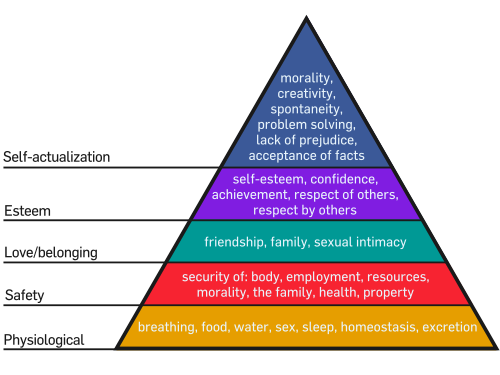
What’s the point of work? Why does your work matter? What are you working towards? Some people would say towards a paycheck, others might even say towards glory if they were being honest, but there are not so many who would say towards value and meaning.
In an illuminating TED talk about motivation at work, behavioral economist Dan Ariely says that people know that meaning is important but don’t grasp just how important it is. And for some reason that makes me think about how one of the most common deathbed regrets is wishing that you’d worked less, because at that stage, I’m guessing, what’s on your mind, what you’re reaching back for is the stuff that mattered.
Meaning, that connection to something larger than ourselves, is essential. But it is pushed aside in the often superficial yet tempting notions of self-improvement, that you’ll be better and happier, you’ll be a winner, when you’re fitter, faster, richer, thinner. And it slips away like a breeze from the principles of efficiency and productivity that continue to dominate the modern workplace despite persistent, crushing degrees of disengagement.
Getting motivation at work right seems like it will unlock success, but we pay a heavy price in not understanding that meaning is the master key.
Maslow’s Hierarchy of Needs is Wrong
In 1943, Abraham Maslow came up with his hierarchy of needs to explain human motivation. His theory was that when you satisfy the first level of needs, you can progress to the next one up. Starting with the most basic, physical needs for survival at the bottom, you advance through increasingly abstract levels — next is security, then love and belonging, then esteem, and then finally at the top, self-actualization, in which you are fulfilling your human potential, finding meaning in life. That progression seems to make a kind of sense — you must eat to survive first, right?

The level-by-level hierarchy reads like a roadmap, and there’s probably nothing more a manager likes than a sensible roadmap. You know what to do with that handy triangle — hey, we just have to work our way to the top. Yet the actual value in Maslow’s motivational pyramid is not the hierarchy but the reminder that human motivation is multifaceted. It’s a useful framing tool to figure out how to engage employees, a balloon of structure to fill up with your breath of ideas.
Take another look at the bottom levels of Maslow’s motivational hierarchy, which are more about carrots and sticks, the kind of incentives that have been proven to be ineffective and misguided. What the hierarchy misses entirely is that the search for meaning is intrinsic and deeply essential. It’s not some layer you put on later to fully become Human 2.0 like a superhero costume. Meaning is the point of another day. As Tony Dokoupil writes, that point is rooted deep within us:
When people see themselves as effective—as providers for their families, resources for their friends, contributors to the world—they maintain the will to live. When they lose that view of themselves, when it curdles into a feeling of liability, the desire to die takes root.
In his TED talk, Ariely also brings up the example of mountaineering, an activity that is “unrelenting misery from beginning to end”. Those most basic needs at the bottom of the hierarchy — hunger, thirst, pain, trouble taking another step, taking another breath, life itself — are threatened. And still, mountaineers keep climbing, and when they reach a peak, they come down, and then climb again. They do this because they find meaning, a shift in perspective, something that matters, in the activity.

There’s a newer order than that assembly line image of productivity, where if you just keep ticking off boxes, keep wrapping chocolates, all’s well with your job as your shift ends and it’s time to go home. Seventy years after the publishing of Maslow’s paper, the nature of work, which is increasingly knowledge work, is amorphous. Likewise, Maslow’s anatomy of needs serves us better if it reflects both that formlessness and our own human nature, we amorphous blobs of needs.
Sucking the Meaning Out of Work is Too Easy
Nothing steals meaning from a job more quickly than when you work really hard on something but it never sees the light of day. The whole idea behind the progress principle — that making progress is the most powerful motivator — doesn’t hold if it doesn’t feel like the work matters. If at the end of the line, the progress you make is for naught or thrown away, then it can’t be progress.
Progress, the existence of this life of wins, big and small, is inextricably tied with what matters to you. Meaning may not be sweeping or grand, but it is significant. A study by Dan Ariely uncovers how meaning makes a difference in even trivial tasks. Participants were paid 55 cents to find ten instances of two consecutive S’s on a sheet of paper with a sequence of letters. After completing each page, people were asked if they wanted to complete an additional page for five cents less, and this continued until they wanted to stop.

The participants were separated into three groups. If you were in the Acknowledged condition, you were told to write your name on each sheet. Upon completing one page, you handed it to an experimenter, who would examine it while nodding positively and then place it in a folder. If you were in the Ignored condition group, there was no instruction to put your name on the sheet, and upon handing your completed sheet to the experimenter, it would just be placed in large stack of papers without a glance. And if you were in the Shredded condition, your experience was much like the Ignored condition, except that your paper would be put right into the shredder.
Here’s what happened: the Acknowledged group completed the most sheets and so earned the most, while the Ignored and Shredded groups clustered near each other in completing less sheets and earning less.

The surprising discovery was that people in the Ignored condition (no name, no examination, no acknowledgment) behaved much more like the people who saw their work shredded before their very eyes. Meanwhile, “almost half of the subjects in the Acknowledged condition were willing to work until the wage dropped all the way to zero.” Even in a task as tedious as finding a repeating pattern among letters, the feeling that there was some sort of meaning to the activity, that it had some value, was sufficient to motivate people to basically work for free.
There’s a finer line than you might think between disregarding someone’s work and actively destroying it. The lesson, Ariely points out in his book, Predictably Irrational, is that “sucking the meaning out of work is surprisingly easy.”
The Search for Significance in Your Work

As Amabile and Kramer write in The Progress Principle, “What matters is whether you perceive your work as contributing value to something or someone who matters (even your team, yourself, or your family).” Meaning isn’t necessarily lofty, as in some unattainable, fairy tale magic bean thing, but it is something larger and greater than ourselves. The function of meaning is that it forms a bridge, extending yourself to a point somewhere beyond. And that might be as close as contributing value to the person next to you.
Meaning comes in many shapes, sizes, forms. While it’s easier to find in certain types of work where it’s easy to see a direct impact on other people or when you’re already in for the greater good, you can still seek something that matters in most types of work. Look to co-workers around you or your customers to gain meaning from a product you’re helping to build, a service you’re helping to deliver, the problem you’re helping to solve.
Connecting with real people causes a significant shift in what you may find worthwhile. Take, for example, the findings of Adam Grant, author of Give and Take, on the impact of that personal connection. Call center workers raising money to fund scholarships met and heard one student talk about how he’d benefited from his scholarship. In one month, the employees spent 142% more time on their calls and increased their fundraising amount by 171%, even though they were still using the same script.
As much as you can, avoid cutting off ownership and autonomy, avoid not trying or refusing to contextualize work and divisions of labor, and avoid ignoring and thus effectively destroying people’s work in front of them. When a project meets the unfortunate fate, for whatever reason, of having its plug pulled, understand that the people who worked on it will, at that project’s deathbed, reach back and really look for what the hell the point was. Don’t let that purpose, value, and investment be shredded and go to waste. Consider how that work could be redirected into new opportunities and add value to future projects or provide learning opportunities for other members of the company.
To echo Umair Haque, meaning is a hunger for transformation, one that we still feel day-to-day alongside our more prosaic need for calories. We feed that hunger by continuing to ask the supremely basic question of why, why something matters, asking like a child a string of “why?”s throughout your days until it is like a mantra that is helping you dig deeper and seeing if you’re building that bridge outward and upward.
This isn’t to discount the undeniable fact that you need the basic security of things like money, food, and shelter to survive. But to consider meaning as irrelevant to how you spend your time and energy, as some final level to attain or last step to take care of, to dismiss that hunger for meaning, for transformation, that is a much poorer life.
Images: [1] Piotr Chlipalski; [2] Wikimedia Commons; [3] chriscom; [4] David Bleasdale; [5] Leo Grübler
Liked this post? Sign up for our newsletter!
